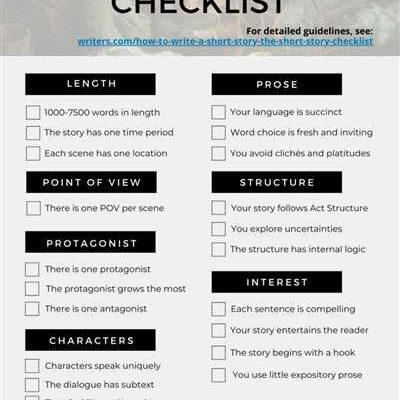
Writing stories can be a fulfilling and creative process, and it is something that anyone can do. Whether you are a professional writer or just someone who enjoys putting pen to paper, the act of storytelling allows you to think outside of the box and explore different ideas.
If you’re new to writing or simply want to improve your storytelling skills, there are a few things you might consider. First, it’s helpful to have a writing kit that includes all the tools you need, such as a notebook, pens, and a computer or typewriter. Having these items on hand can make the writing process simple and enjoyable.
Starting a story is often the hardest part, so don’t be too hard on yourself if you find it difficult to finish a piece. Sometimes, it can be helpful to set a goal for yourself, such as completing a certain number of words or pages in a day or week. This can help you stay motivated and give you a clear sense of progress as you work towards finishing your story.
When writing a story, it’s important to consider your audience and the category of your work. Are you writing for children, young adults, or a general audience? This can help you determine the tone and style of your writing. Additionally, thinking about the storyline and plot of your story is crucial, as it will guide the narrative and keep your readers engaged.
While it’s helpful to have a plan, don’t be afraid to deviate from it if you come up with new ideas along the way. Writing is a flexible and creative process, and sometimes the best stories are those that are written without strict rules or guidelines.
As you write, you may find that you encounter writer’s block or struggle to come up with new ideas. In those moments, try to step away from your writing and give yourself time and space to recharge. Engage in activities that inspire you, such as reading, going for a walk, or listening to music. You never know when inspiration will strike!
Once your story is written, consider seeking feedback from others. Sharing your work with trusted friends, family members, or writing groups can provide valuable insights and help you improve your writing. While it can be intimidating to receive criticism, remember that it’s all part of the learning process.
In conclusion, writing stories is a skill that can be developed with practice, patience, and an open mind. Whether you’re an experienced writer or starting out, don’t be afraid to explore new ideas and take risks with your writing. And always remember, the most important thing is to enjoy the process and have fun!
Rules of Writing a Story
When it comes to writing a story, there are a few rules that every writer should keep in mind. These rules can help you create a great story that will captivate your readers and leave a lasting impression. Here are some of the most important rules to consider:
| Think of a good storyline: | Before you start writing, you need to come up with a compelling storyline. This is the backbone of your story and will guide the plot and characters. |
| Analyze your ideas: | Take the time to analyze your ideas and see if they have the potential to be developed into a full story. Look for interesting characters, conflicts, and themes. |
| Don’t be afraid to ask for help: | If you’re struggling with your story, don’t hesitate to ask for help. Other writers or writing communities can provide valuable feedback and guidance. |
| Read great stories: | Reading well-written stories can help you improve your own writing skills. Pay attention to how the author develops characters, builds tension, and creates a satisfying ending. |
| Use third-party sources: | Research can be a valuable tool for writers. Use third-party sources to gather information and add depth to your story. But be careful to properly credit and verify your sources. |
| Keep your data stored: | Make sure to save your work regularly to avoid losing any progress. Cloud storage services can be a great help in this regard, as they automatically save your work and allow you to access it from anywhere. |
| Write without excuses: | Don’t let excuses get in the way of your writing. Even if you don’t feel inspired or motivated, sit down and write anyway. You can always edit and revise later. |
| Don’t overload your story with information: | While it’s important to provide enough background information to engage your readers, be careful not to overwhelm them with too much unnecessary detail. Only include what is essential to the plot and characters. |
By following these rules, you can improve your storytelling skills and create compelling stories that will captivate your audience. Whether you’re a seasoned writer or just starting out, these guidelines can help you on your journey to becoming a great storyteller.
How to Write a Great Story Even if You Don’t Think You Can
Writing a great story can seem like an overwhelming task, especially if you don’t consider yourself a skilled writer. However, with the right mindset and approach, anyone can create a compelling and engaging story. Whether you’re a beginner or an experienced writer, the following steps will help guide you through the process.
1. Open your mind
One of the first things you need to do is open your mind to the idea that you can write a great story. Don’t let self-doubt hold you back. Believe in your abilities and believe that you have unique and interesting stories to share.
2. Start with a simple storyline
When beginning your story, start with a simple storyline. Don’t worry about complex plots or intricate details. Focus on developing a clear and concise narrative that will captivate your readers.
3. Analyze data from other great stories
Great writing often comes from studying and analyzing other successful stories. Take the time to read books, watch movies, or listen to podcasts in the same genre or category as your story. Pay attention to the structure, character development, and writing style that make these stories so compelling.
4. Write without self-criticism
When you sit down to write, don’t worry about creating a masterpiece on your first attempt. Just let the ideas flow and write without self-criticism. The editing and fine-tuning can come later. Remember, the most important thing is to get your ideas out of your head and onto the page.
5. Utilize third-party tools
There are various writing tools available that can help improve your writing performance. Google Docs and other writing applications offer features like spell check, grammar suggestions, and word count. These tools can provide invaluable assistance and make the writing process easier.
6. Utilize user feedback
If you’re comfortable sharing your work with others, seek feedback from trusted friends, family members, or writing groups. Their input can be extremely valuable. Consider their suggestions and make changes where necessary to improve your story.
7. Don’t be afraid to break the rules
While there are guidelines and techniques that can help structure your story, don’t be afraid to break the rules. The best stories often defy expectations and take risks. Be innovative and add your unique voice to the narrative.
8. Write regularly
Consistency is key when it comes to writing. Set aside time each day or week to work on your story. Make it a habit, just like any other activity or routine in your life.
9. Use the cloud to store your work
Make sure your work is safely stored by using cloud services like Google Drive or Dropbox. This way, your work is backed up and accessible from any device, ensuring you don’t lose any progress you’ve made.
10. Believe in yourself and your story
Most importantly, believe in yourself and your story. Trust that you have something valuable to say and that your words have the power to inspire, entertain, or provoke thought. Don’t let self-doubt be an excuse for not writing.
In conclusion, writing a great story is within reach for anyone. With the right mindset, a clear and simple storyline, and a willingness to learn and improve, you can write a story that captivates readers and leaves a lasting impact.
Life Kit
If you’re a writer, you probably understand the importance of having a well-considered guide to help you organize your ideas and finish your story. Life Kit is a great tool that can assist you in this process. It is a simple and user-friendly website where you can write, store, analyze, and even share your stories.
Life Kit allows you to open a new category for each story you write. This way, you can keep all your ideas and drafts in one place, without mixing them up. You can create as many categories as you need and easily switch between them to work on different storylines.
Life Kit also helps you stay organized by storing your data in the cloud. This means that even if you don’t have your computer with you, you can still access your stories from any device with an internet connection. This flexibility allows you to work on your writing anytime and anywhere.
Life Kit also offers a feature called “story cookies,” which are like cookies in your browser. They help you track your writing performance by analyzing the time and load speed for each session. This information can be helpful in understanding your writing patterns and improving your productivity.
If you’re concerned about the privacy of your work, Life Kit has got you covered. It understands the importance of keeping your ideas safe and secure. That’s why all your data is encrypted and stored securely in their servers. Life Kit also respects your privacy and does not sell or share your information with any third-party without your consent.
Life Kit is a free tool that can be easily accessed through your web browser. You don’t need to download or install anything. Simply open the website, sign up, and start writing. It’s that simple!
So don’t let the excuse of not having a proper writing tool hinder your creativity. Give Life Kit a try and see how it can help you in your writing journey. Whether you’re a professional writer or just starting, Life Kit is here to support you with a simple and user-friendly writing platform.
Sources
When it comes to writing a good story, you need to have a well of ideas to draw from. Here are a few sources that can help you in the process of writing:
| Source | Description |
|---|---|
| Life experiences | Draw from your own life and the experiences you’ve had. This can provide a rich source of material for your stories. |
| Books and articles | Read books and articles in the genre you’re interested in. This can help you analyze the techniques used by other writers and get inspiration for your own work. |
| Online resources | There are plenty of websites that offer guides, tips, and ideas on how to write engaging stories. You can use these resources to learn more about the craft of writing and improve your skills. |
| Cloud storage | Storing your work in the cloud can be a simple and effective way to keep your story ideas and drafts organized and easily accessible from anywhere. |
| Third-party apps | Using writing apps and software can help streamline your writing process and provide a guide to help you organize your thoughts and ideas. There are many apps available that can assist with story development and writing. |
| Google and online search | Google and other search engines can be a great resource for finding information and ideas for your story. Just be sure to consider the reliability and credibility of the sources you find. |
| Cookies | Some websites use cookies to track user data and analyze user behavior. While this may not directly help you with the writing process, it can provide valuable insights into how readers interact with your story and what they like or dislike. |
By utilizing these sources, you can gather a wealth of information to help you write a great story. Whether you’re a seasoned writer or just starting out, finding and using the right sources can make a big difference in the quality of your work.









